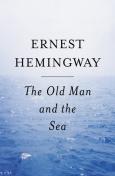BKMT READING GUIDES
The Old Man and The Sea
by Ernest Hemingway
Paperback : 128 pages
34 clubs reading this now
8 members have read this book
Here ...
Introduction
The Old Man and the Sea is one of Hemingway's most enduring works. Told in language of great simplicity and power, it is the story of an old Cuban fisherman, down on his luck, and his supreme ordeal -- a relentless, agonizing battle with a giant marlin far out in the Gulf Stream.
Here Hemingway recasts, in strikingly contemporary style, the classic theme of courage in the face of defeat, of personal triumph won from loss. Written in 1952, this hugely successful novella confirmed his power and presence in the literary world and played a large part in his winning the 1954 Nobel Prize for Literature.
Editorial Review
Here, for a change, is a fish tale that actually does honor to the author. In fact The Old Man and the Sea revived Ernest Hemingway's career, which was foundering under the weight of such postwar stinkers as Across the River and into the Trees. It also led directly to his receipt of the Nobel Prize in 1954 (an award Hemingway gladly accepted, despite his earlier observation that "no son of a bitch that ever won the Nobel Prize ever wrote anything worth reading afterwards"). A half century later, it's still easy to see why. This tale of an aged Cuban fisherman going head-to-head (or hand-to-fin) with a magnificent marlin encapsulates Hemingway's favorite motifs of physical and moral challenge. Yet Santiago is too old and infirm to partake of the gun-toting machismo that disfigured much of the author's later work: "The brown blotches of the benevolent skin cancer the sun brings from its reflection on the tropic sea were on his cheeks. The blotches ran well down the sides of his face and his hands had the deep-creased scars from handling heavy fish on the cords." Hemingway's style, too, reverts to those superb snapshots of perception that won him his initial fame:Just before it was dark, as they passed a great island of Sargasso weed that heaved and swung in the light sea as though the ocean were making love with something under a yellow blanket, his small line was taken by a dolphin. He saw it first when it jumped in the air, true gold in the last of the sun and bending and flapping wildly in the air.If a younger Hemingway had written this novella, Santiago most likely would have towed the enormous fish back to port and posed for a triumphal photograph--just as the author delighted in doing, circa 1935. Instead his prize gets devoured by a school of sharks. Returning with little more than a skeleton, he takes to his bed and, in the very last line, cements his identification with his creator: "The old man was dreaming about the lions." Perhaps there's some allegory of art and experience floating around in there somewhere--but The Old Man and the Sea was, in any case, the last great catch of Hemingway's career. --James Marcus
Discussion Questions
1. What is suggested when Manolin says to Santiago that his father "hasn't much faith" (p. 10) but that he, himself, "would like to serve in some way" (p. 12)? Does this offer of Manolin's asking to throw the "cast net" (p. 16) echo the Bible and underscore the boy's respect for Santiago? Why is Santiago so worthy of Manolin's respect?2. Why is the boy so important to Santiago? Despite his bad luck, Santiago's hope and confidence remain, even "freshening as when the breeze rises" (p. 13) as the boy helps him prepare for his next fishing trip. What does this statement indicate about the role Manolin plays in Santiago's life? Could "the boy" be regarded as a metaphor? How?
3. Like other Hemingway characters, Santiago is very much alone, "beyond all people in the world" (p. 50); yet he says, "No man was ever alone on the sea" (p. 61). Why? Does he feel joined with the creatures and universe or strengthened and sustained by them in any way? Do his dreams of the lions or reflections about his earlier strength support him?
4. Although determined to kill the fish, Santiago says that he loves and respects it, and on the third day of his struggle he says, "Never have I seen a greater, or more beautiful, or a calmer or more noble thing than you, brother. Come on and kill me. I do not care who kills who" (p. 92). Is Santiago ennobled by his fight? Does it define his character?
5. How does the story of Santiago confirm the presence of two themes prevalent in Hemingway's fiction: "the undefeated" and "winner take nothing"? Santiago says, "A man can be destroyed but not defeated." Do you agree? Can the novella be read as an allegory, a story with levels of meanings? Is it merely Santiago's story, or our story also?
Book Club Recommendations
Recommended to book clubs by 3 of 3 members.
Book Club HQ to over 90,000+ book clubs and ready to welcome yours.
Get free weekly updates on top club picks, book giveaways, author events and more








